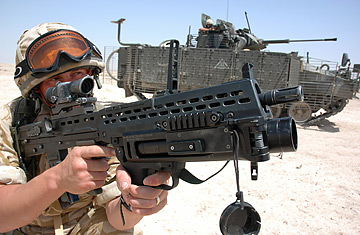
A British infantryman near Basra, Iraq.
Anthony Cordesman, a Middle East military expert and former national security aide to John McCain , says London's drawdown only cements Shi'ite power in southern Iraq. Shi'ite police in the region have been conducting sometimes deadly sect-based operations against Sunni residents for months, he says, and local politics have devolved into "a fractured mess" delinked from national political parties. "The coming British cuts in many ways reflect the political reality that the British `lost' the south more than a year ago," Cordesman, who has traveled to the region frequently, writes in a Wednesday analysis from his office at the Washington-based Center for Strategic and International Studies. "The Shi'ites will take over, Iranian influence will probably expand, and more Sunnis, Christians, and other minorities will leave."
In fact, Cordesman fears that the brutal Shi'ite control of Basra and southern Iraq will spread to greater Baghdad and make the already bad situation there that much worse. Shi'ite militias in the capital appear to be standing down and not challenging U.S. and Iraqi forces as they attempt to quell the bombings and bloodshed that have gripped the city for the past year. That leaves insurgent Sunnis as the main target of the effort. "In effect," Cordesman says, "both the U.K. and the U.S. may end up acting to expand Shi'ite influence in very different ways." That, of course, would expand the influence of Shi'ite Iran in Iraq, and unsettle majority-Sunni states like Egypt, Jordan and Saudi Arabia.
Cordesman's bleak outlook comes on the heels of a recently released study by the Washington Institute for Near East Policy that warns that democracy is a long way from coming to the southern part of the country. In their report, "The Calm Before the Storm: The British Experience in Southern Iraq," Michael Knights and Ed Williams observe that greater Basra "has suffered one of the worst reversals of fortune of any area in Iraq since the fall of Saddam's regime." Once a cosmopolitan city and the center of Iraq's oil industry, the city — under British control — has become a violent maelstrom of warring Islamic elements. While the British initially could patrol the city without helmets, now they travel in heavily armored vehicles. "Basra is increasingly a kleptocracy used by Islamist militias to fill their war chests," the report says.
A grim assessment cited in the report comes from Brigadier James Everard, who led British troops in Basra until three months ago. "Freedom of speech, freedom of expression: it just hasn't quite worked out the way it was planned," he is quoted as saying. "They're just not prepared to debate. They tend to do things at the end of a gun."
The authors ask a series of questions about Basra and Britain's role there: "Basra's slide into chaos poses many uncomfortable questions. What dynamics caused the dramatic reversal? What role has Iran played in the region? Was Britain fully committed to the task of bringing representative moderate governance to the deep south? Did the British style of community soldiering and minimal use of force help or hinder the effort to stabilize southern Iraq? Can the deterioration be reversed? Most important, what happens next?"
Those questions could just as fairly be asked of Washington and its presence across the rest of the country.
